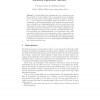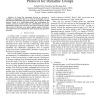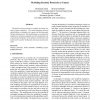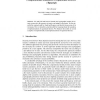1777 search results - page 43 / 356 » Programming Cryptographic Protocols |
129
click to vote
ASIACRYPT
2010
Springer
15 years 8 days ago
2010
Springer
Private Set Intersection (PSI) protocols allow one party ("client") to compute an intersection of its input set with that of another party ("server"), such tha...
105
click to vote
LPAR
2007
Springer
15 years 8 months ago
2007
Springer
Abstract. In formal approaches, messages sent over a network are usually modeled by terms together with an equational theory, axiomatizing the properties of the cryptographic funct...
136
click to vote
GLOBECOM
2007
IEEE
15 years 8 months ago
2007
IEEE
A Group Key Agreement protocol is a process to establish a cryptographic key for a group of participants over an open network. In this paper, we propose a group key agreement(CAGKA...
104
click to vote
IEEEIAS
2007
IEEE
15 years 8 months ago
2007
IEEE
We model security protocols as a game tree using concepts of game semantics. The model interprets protocol specifications as strategies over a game tree that represents the type ...
105
click to vote
TGC
2007
Springer
15 years 8 months ago
2007
Springer
Abstract. We study the link between formal and cryptographic models for security protocols in the presence of passive and adaptive adversaries. We first describe the seminal resul...




